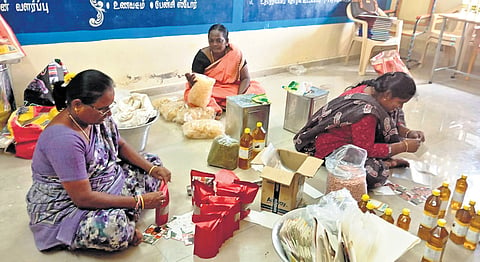

CHENNAI: When M Deepa, a 36-year-old farmer from Kattankulam village in Uthiramerur block, Kancheepuram, took a firm decision to return to traditional methods of organic farming, there was a trigger. The Covid-19 pandemic had wiped out low-income, but stable jobs for the village women. When the women were looking for a way to make ends meet, with organic farming practices and fair pricing for produce, she knew an organisation could transform their situation.
Deepa was not alone in this silent revolution. Inspired by the efforts of the Nandivarman Mathi Women Farmer Producer Company Limited (NWFPC), hundreds of women farmers from the block followed suit, embracing a more natural way of farming.
“Without the struggle with middlemen, transport charges, and securing a fair price for produce, it has become easier to practice farming now,” said Deepa, who has been practicing the methods on her two acres of land. “Everything changed once I teamed up with NWFPC. Its directors visit my land directly and purchase products like groundnut and black gram, and transport them at their own risk,” she added.
Furthermore, NWFPC provides periodic information about organic farming practices and helped establish a producers’ group in her village, offering low-interest loans for farming.
While speaking to TNIE, on the beginnings of NWFPC, Chairperson B Selvi said, “We have relied on farming as a source of income. However, the high cost of agricultural inputs and the associated health risks have been a constant concern. Therefore, we have chosen to promote organic farming and started spreading awareness among the local community.”
NWFPC began operations in 2022 with 1,500 women shareholders, aiming to create employment opportunities for women, preserve traditional farming practices, and ensure fair pricing for agricultural products in the region without intervening middlemen. Post pandemic, there were fewer jobs, and women could not contribute to their families anymore. This led many to look for business opportunities to support themselves, Selvi added.
“In March, 2022, through the Tamil Nadu State Rural Livelihoods Mission, we decided to bring small farmer groups together under a producer company. A team of 10 women visited 73 panchayats in Uthiramerur block, gathering 1,500 women farmers who invested Rs 1,000 each to start the NWFPC,” she said, adding that the organisation has one chairperson and nine directors, currently. “The major crop in Uthiramerur is groundnut. That is why we chose it to make products. We got machines as a subsidy from the state government and are now producing natural gingelly, groundnut, and coconut oil,” Selvi explained.
P Mohanasundari (48), one of the directors, shared the story behind the name NWFPC. “Uthiramerur has a history dating back to 1,250 years. It was once ruled by the Pallava King Nandivarman, and we decided to name the company after him,” she said. Mohanasundari, while elaborating on the groundwork laid to source and sell organic products, said, “We identified individuals from all panchayats in the Uthiramerur block and personally visited these villages. We procured their products once we confirmed that the farmers were practising organic methods. Our company is also certified by the food safety department.”
Explaining the innovative barter system, she added, “In 2023, we visited the Jawadhu Hills, where farmers grow traditional crops such as black rice (karuppu kavuni), black gram, Samai, Thenai, and Ragi. Since we could not afford to invest large sums of money to procure these items, we proposed a barter system known as ‘Panda MattruMurai,’ a practice followed over a century ago. The farmers accepted this, and we exchanged groundnuts for various types of millet. These millets are now part of our product range as well.”
Esther Vinnarasi (40), a director of NWFPC, said, “Since we are still in the growth phase, our annual income remains under `4 lakh. Despite not paying dividends to shareholders in the past couple of years, we have submitted the balance sheet at our general body meetings, and shareholders have accepted it.” However, she remains optimistic about the future. “We hope to begin providing returns to our shareholders in coming years,” Esther said.
Shedding light on their marketing strategies, Selvi said, “To raise awareness about our products, we organise special sales stalls at various locations. We are also pushing for bulk sales, and many wholesalers have approached us after recognising the quality of our products. Furthermore, we are preparing to launch online sales through a dedicated website and mobile application. By the end of this month, we expect to go live with our online platforms.”
Selvi also underscored the broader mission of the NWFPC and said, “Our goal is to empower women in rural areas, not just financially but also by fostering a self-reliant community.”
(Edited by Meghna Murali)